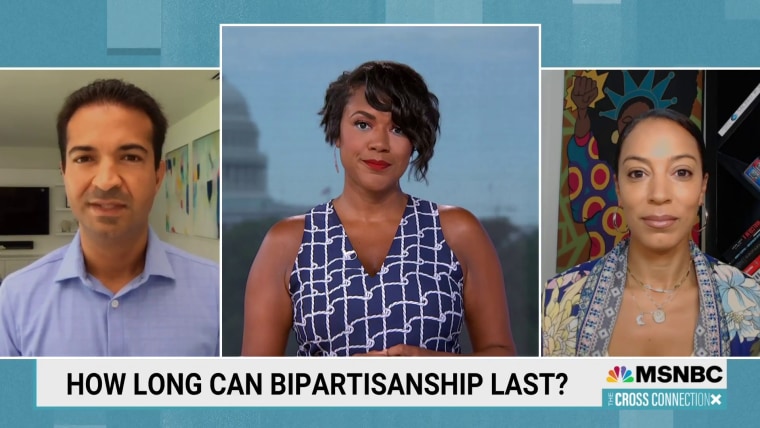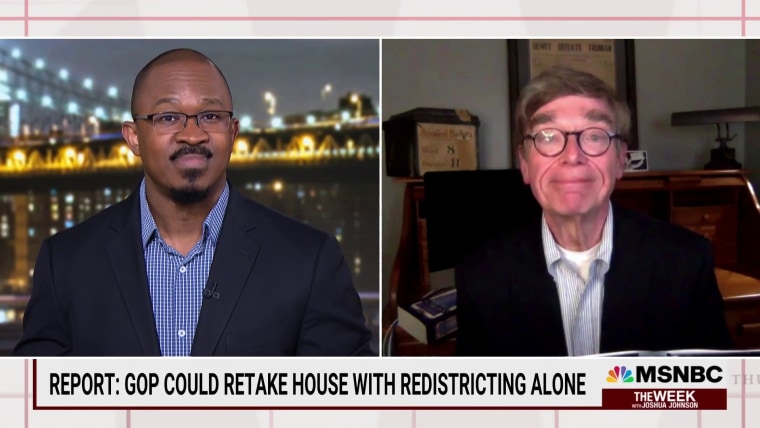Dems' Voting Rights Act update is very good — and maybe too late
There’s a lot of good in the House Democrats’ latest attempt to shore up voting rights ahead of next year’s midterm elections. In an ideal world, I’d even say the updates to the John Lewis Voting Rights Advancement Act were worth the wait.
The extra time taken to draft the bill, which was introduced Tuesday, allowed for Rep. Terri Sewell, D-Ala., the lead author, to effectively nullify the Supreme Court’s latest defanging of the Voting Rights Act. In particular, the bill would revitalize the Justice Department’s authority to sue states for discriminatory election laws under Section 2 of the Voting Rights Act, and it would make it so states would have to provide actual evidence of “voter fraud” to justify their changes to election laws if they’re sued under that same section of the law.
That would be bad news for states that want to follow in Georgia’s footsteps and cite nonexistent “voter fraud” as a pretext for changing election law.
But for all the improvements in the Voting Rights Advancement Act, the clock keeps ticking. Every week that passes without this bill becoming law, the greater the chance that Republicans will win back control of the House before a single vote is cast.
When the Supreme Court in 2013 invalidated Section 4 of the Voting Rights Act in 2013, it gutted the main enforcement provisions of the law. That section provided the formula under which states and counties would have to get “preclearance” for any changes in their election laws to prevent discrimination at the polls. No formula means no preclearance powers for the Justice Department, which opened the door to a slew of election changes in GOP-controlled states. The Supreme Court made matters worse this year in Brnovich v. Arizona, the case that has made it harder to sue for alleged Section 2 violations.
The good news is that the Democrats’ bill would not only respond to the court’s malpractice in the Brnovich decision, but it would also strengthen the preclearance rules under a new formula. As Travis Crum, an associate professor of law at Washington University in St. Louis, explained in a guest post at Election Law Blog, any rollback of laws that make it easier for minorities to vote would be fair game for a lawsuit from the Justice Department.
“In the short term, a retrogression requirement in Section 2 would be used against jurisdictions that have rolled back pandemic-era laws that made it easier to vote in 2020,” Crum writes. That would be great for warding off future attempts to cut back on voting by mail and other options, as the Republicans in the Texas Legislature are trying.
More from MSNBC Daily
Must reads from Today's list
While the House is expected to take up the bill next week and pass it during a brief interruption in its August recess, the Senate is in no way poised to get this bill over the finish line any time soon. Yes, it’s the preferred voting rights bill of Sen. Joe Manchin, D-W.Va., who has made his opposition to the more sweeping For the People Act clear. And, yes, it has the support of Sen. Lisa Murkowski, R-Alaska. But that’s still nine GOP votes shy of getting past a filibuster.
As it stands, the Voting Rights Advancement Act may already be too late to affect next year’s federal elections. States are beginning to redraw congressional districtsbased on new census data. And one analysis projects the GOP gaining up to 13 seats and thus retaking the House based on gerrymandering alone.
The deadline for redistricting varies from state to state, so there’s still a narrow window of time to pass the Voting Rights Advancement Act. But even if the bill were to become law, it’s not clear whether the Justice Department would be able to spin up its preclearance procedures quickly enough to allow for final maps to be drawn ahead of next year’s primary elections. And the Supreme Court isn’t exactly poised to side with voting rights advocates in any challenges to the bill’s constitutionality.
The Voting Rights Advancement Act wouldn’t go as far to shore up voting rights as the For the People Act — but it would provide a shield that has been desperately needed for the last decade. However, it would be a shield that would never be used as long as Senate Democrats let Republicans wield the filibuster as a weapon."


No comments:
Post a Comment